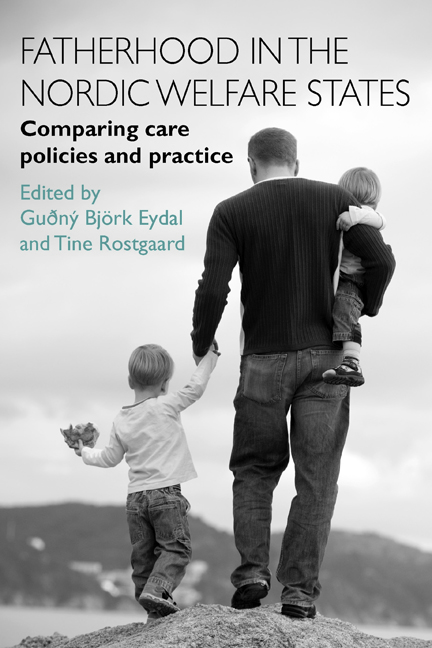Book contents
- Frontmatter
- Contents
- List of tables and figures
- Notes on contributors
- Acknowledgements
- one Introduction
- Theme 1 Fathers, families and family policies
- Theme 2 Fathers in everyday life – culture, work and care
- Theme 3 Constructing fatherhood in different family settings
- Theme 4 Caring fathers and paid parental leave policies
- Theme 5 International reflections on findings
- Conclusions
- Index
fifteen - Caring fathers and parental leave in prosperous times and times of crisis: the case of Iceland
Published online by Cambridge University Press: 04 March 2022
- Frontmatter
- Contents
- List of tables and figures
- Notes on contributors
- Acknowledgements
- one Introduction
- Theme 1 Fathers, families and family policies
- Theme 2 Fathers in everyday life – culture, work and care
- Theme 3 Constructing fatherhood in different family settings
- Theme 4 Caring fathers and paid parental leave policies
- Theme 5 International reflections on findings
- Conclusions
- Index
Summary
Introduction
In Iceland, the legislation on paid parental leave from 2000 drastically changed the scene for parents, and put Iceland at the forefront of the Nordic nations in terms of quotas for fathers. The law provided each parent with non-transferable rights to a three-month paid leave of absence and an additional three-month leave that they are free to decide how (or if) to share between the parents. This chapter examines the origins of this – in a comparative sense – radical policy of de-gendering leave take-up. Second, the chapter discusses how Icelandic fathers capitalised on the new opportunities and how leave take-up differs between different social groups of fathers. Finally, the chapter follows the policy development and usage among fathers in the aftermath of the 2008 financial crisis, primarily in order to estimate if a crisis leads to a reversal or re-examination of the policies and practices introduced during economic boom years. The theoretical framework of the chapter considers the policy–practice interplay: how the policies on a father's quota, which has the declared aim of changing the division of unpaid labour between parents, have framed fathering practices; at the same time, however, it is assumed that the fathering practices and how the policies were perceived in general have also influenced the policymaking. Hence, the chapter investigates which social prerequisites are required in order for fathers to make use of parental leave.
The main results are that the origins of the policy are multifaceted, but the political agreement regarding the importance of non-transferable entitlement to parental leave seems firm. Paternal take-up is high, which seems to have facilitated development towards increased gender equality in society in general.
The policy–practice interplay
The task of examining the extent to which individual doings are the result of own decisions or the result of influences from social structures affecting individuals – that is, the agency–structure question – is at the core of sociology. In recent decades, influential scholars in family studies have emphasised the importance of individualisation and how individuals are now ‘doing’ families rather than ‘being’ families, meaning that families and family-making is not only prescribed by traditions and structures, but each individual decides for themself what kind of family they want to create, to an unprecedented degree in modern history (see, for example, Giddens, 1992; Beck and Beck-Gernsheim, 2002; Júlíusdóttir, 2009; Kjorholt, 2011).
- Type
- Chapter
- Information
- Fatherhood in the Nordic Welfare StatesComparing Care Policies and Practice, pp. 325 - 346Publisher: Bristol University PressPrint publication year: 2014
- 1
- Cited by

